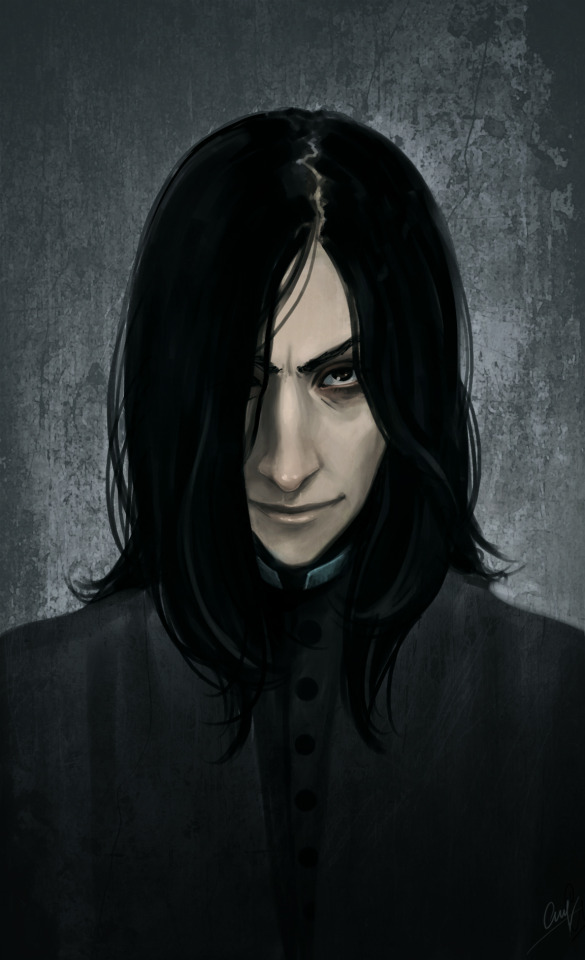I use this account to follow Snape stuff. Prev name assassin-nero.
Don't wanna be here? Send us removal request.
Text

“I love you as certain dark things are to be loved, in secret, between the shadow and the soul.” – Pablo Neruda
It was a love like he had never imagined. In all fairness, it was a love no one *could* ever imagine, unlikely in magnitude and in essence. From the first time Trevor had sat in his hand, so content it might as well have purred, Severus knew this was love. From that day forward, he made sure never to run out of swelling solution. With the potion's help, the love between man and toad could blossom. Severus' gratitude, for whatever had possessed Longbottom to show up to class with his pet, knew no bounds.
Trevor handed him a gift, and Severus took it, knowing he had no need for it - the *real* gift, currently gazing lovingly at Severus, had let him drip potion into its trusting mouth all those months ago. "I love you, Severus", Trevor croaked. "Don't let the child keep us apart ever again."
A collaboration with @dementedlollipop - we wanted to celebrate the passion and love of this beautiful ship. She did the lineart and I coloured it. Thank you to @pet-genius for putting into words how this beautiful pairing leaped into existence!
413 notes
·
View notes
Text
"Oh so you like the Harry Potter books?"
No I like Severus Snape there's a difference
1K notes
·
View notes
Photo
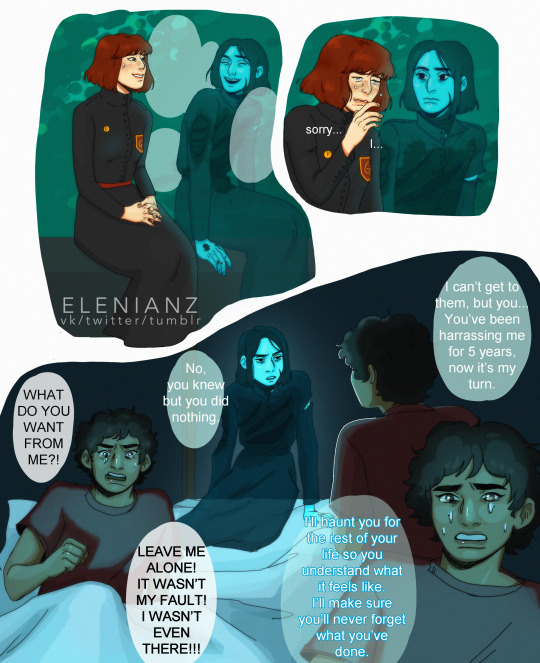
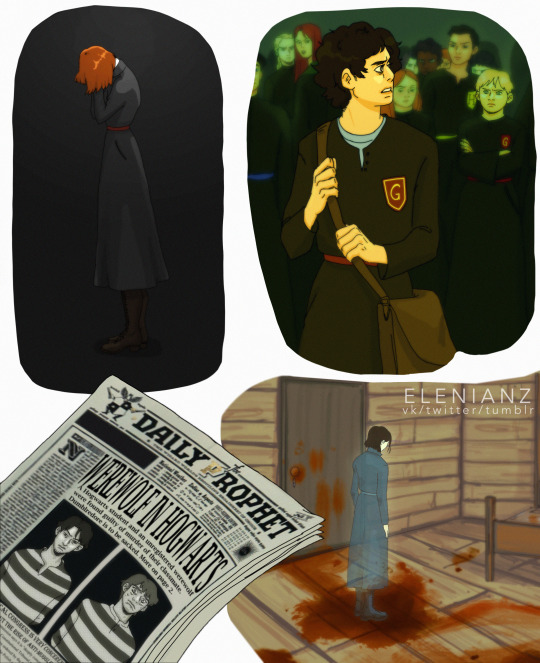
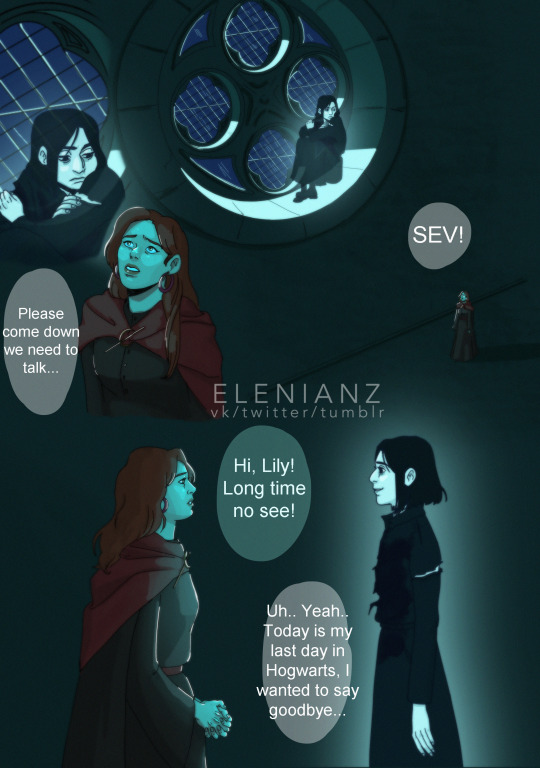
Ghost AU fun is over!
[Severus Snape dies during the werewolf prank, becomes a ghost and now haunts James Potter]
More of this AU:
Severus & Moaning Myrtle hanging out
James is being haunted
2K notes
·
View notes
Photo


It’s that time of the year when seasonal Harry Potter spreads very easily and I happened to catch it.
4K notes
·
View notes
Text
We don't know how Severus used it, if it was to sexually humiliate someone or a way to neutralise attackers, or anything else. We do know how James used it as a tool of sexual humiliation. Just as a needle can be used to sew or to poke an eyeball, it depends on the caster how the spell is used, not the creator. Your attempt at justifying the marauders' sexual assaults is weak af and depends on fluffy headcanons.
The whole post is bad, but I do want to address one point. Sirius was not the only one who didn't care about life. They all didn't. They set a werewolf free in the grounds and laughed after the many close encounters, but kept doing it. In that context what sirius did is not a big deal, and it isn't treated as such by the text. Lupin, when telling the trio refers to it as a trick, minimises it completely and according to him the major consequence of that event according to him is Snape knowing that he was a werewolf, not that Sirius almost used him to kill someone as a joke. They do the SWM stuff ***after*** the werewolf incident and are utterly remorseless. They also don't do it out of revenge or any moral reason. Otherwise James would try to defend himself. Or Sirius, when Harry asks him later. They have no excuses. They torture a guy who one of them almost got killed months ago, who holds one of their friend's biggest secret, *just because they are bored and he's there*
Like them all you want. There are some likeable qualities about them. Their friendship and bravery or whatever people see in them. Just don't make stuff up to do it. Pretty sure your 'Remus got pantsed too' is an extrapolation of Remus saying it was a famous spell that happened everywhere. That's a vague, happy fond recollection of someone remembering the stuff they did in school, nowhere close to getting hung upside down infront of a crowd and having a guy who just tortured you asking the crowd if they want to see him take his underwear.
Snape’s worst memory is getting pantsed at school in front of people with a spell he created.
James worst memory is being killed by one of the darkest wizards in the world and knowing that his wife and son were next
Remus’ worst memory is NOT getting pantsed at school, despite the fact that it happened several times. His worst memory is turning into a blood thirsty monster once a month and tearing his body apart. His worst memory is dying and knowing he’s left his wife a widow and his son fatherless
Sirius’ worst memory is finding the bodies of his best friends and their mutilated son. His worst memory is spending 12 years in prison for a crime he didn’t commit. His worst memory is being tortured for those 12 years by his worst memories.
Please do not ever say Snape was a victim. He pretencious. He was cruel. He was pathetic. He was racist. But he was never a victim.
701 notes
·
View notes
Text
Hermione is interesting in that she can be very ruthless when she feels it necessary. Locking Rita Skeeter in a jar, cursing the DA parchment and not telling anyone, all these are examples of Hermione being willing to do things that would normally be considered immoral for the greater good. She also has a drive to make the world better, as shown with her S.P.E.W movement. Who does this remind me of? Albus Dumbledore. Dumbledore is also a character who is willing to get his hands dirty in order to achieve the greater good. He has his S.P.E.W equivalent in how he was willing to take a risk and accept Remus Lupin at Hogwarts in secret, born by a desire to correct an injustice.
What's the difference between them? Dumbledore got burnt. As a young man, he was ambitious and had grand dreams, but his experience with Grindelwald was so traumatizing to him that he came to believe that he could not be trusted with certain things: power and Dark Magic. He never uses Dark Magic in the series that we see, and seems to heavily disapprove of it. He refuses becoming Minister of Magic three times, even though supposedly he was popular enough that he could easily win. It's not that he can't lead, but he doesn't seem comfortable assuming any leadership roe over society, the way he did when young. Dumbledore's negative experiences with his own ruthlessness and ambition have left him a lot more cautious and wary of these qualities. Hermione never had any sort of similar experience. She is always validated in her use of force, in that they never have any negative effects beyond the inherent ones, and achieve their aims. She's Dumbledore, but without the caution and self-awareness of the dangers of ruthlessness and ambition.
This is interesting to me, in that while Dumbledore could indeed have done a lot of good if he had been more proactive in his pursuit of power as an adult, he also could have done a lot of bad. I tend to read Hermione as having political ambitions post Hogwarts. The question is, without the wariness and self-awareness that Dumbledore has, is this a good thing? I don't know, but it would be interesting to find out.
88 notes
·
View notes
Text
I want to read a combo of the potions mistress and come once again and love me. So 38 yr old nasty lily encounters 38 yr old bitchass snape in their alternate universe thing but in their 16 yr old bodies
203 notes
·
View notes
Text
"Snape is a bad person but a great character" is nonsense
Nah.
Snape being a bad person makes him a horrible character. For example, if he was merely obsessed with Lily as a prize to be won and didn't care about her as a human being, why did the potions and dark arts genius never use his gifts to achieve his goals? Some Slytherin, really. Why was he inexplicably incompetent at serving the bad side or even doing bad to accomplish his ultimate goal of getting Lily all to himself, but absolutely and indispensably effective in furthering Dumbledore's agenda?
If you assume he is bad, he makes zero sense. That's not to say he never did bad, but it all falls into place neatly (and beautifully) if you assume that he was a good person who was led very far astray due to external circumstances and then clawed his way back to "goodness", even if he remained, throughout, a real piece of work.
Why did he not take... any of the many chances that presented themselves to hurt others, including his enemies, even when doing so would have been beneficial, not as a Death Eater (apparently) and not as a spy? Has anybody ever actually put 17 years of his life toward a cause a dead woman believed in... because he was into her?
Next. If you choose to believe that James and Snape were "rivals" and that Snape had all of it coming, that completely undermines Harry's character development in OOTP and in DH, meaning that "Snape bad" not only makes Snape a bad character, it also takes away from Harry. Harry Potter is a story about the power of love in the battle of good and evil, among other things, and that "Snape bad" stuff undermines the entire fucking theme. Also, it makes Lily, officially, a piece of shit who never inspired even the semblance of goodness with her legendary (and entirely off page) kindness and goodness, and takes away what little James had going for him.
I don't wanna be all beauty is truth, but when interpreting fiction, certainly the interpretation that doesn't instantly turn the work into a pile of incoherent excrement is the truth, isn't it? "Snape = bad" takes so much away from the story and adds... nothing. I just don't understand who would want to read that miserable book.
113 notes
·
View notes
Text
The Death Eaters as a Cult - Part 1
This is a very lightly edited old Reddit post, that I'll publish in parts because the whole thing is like 7000 words. Analyzing Voldemort, the DE and their dynamics, Dumbledore and Harry in comparison, and individual Death Eaters. Hope you like it!
Some say Voldemort is a cartoon villain, or wizard Hitler. I think he is very realistic, and that the focus on his political aspirations ignores interesting aspects of him. I cannot prove that JKR had cults in mind when she wrote Voldemort and his followers, but this is how I read them. It’s nearly impossible to define a cult, so, for the purpose hereof, I’m going with “a group dedicated to the worship of a person”. Many cult leaders in real life present themselves merely as “god’s voice” or “the messiah”, but Voldemort specifically didn’t bother to hide behind a power higher than himself.
Tom Riddle comes from humble beginnings, like many cult leaders - he’s raised in an orphanage. He already has delusions of grandeur, only in this case they’re not delusions, because he really is magic, which makes it all the more dangerous. Look how he reacted to discovering he was a wizard, and how Harry did.
Immediately following the revelation that Lily and James did not die in a car crash, and that Harry is famous, and that he survived an attempt at his life by the worst wizard in history:
Hagrid looked at Harry with warmth and respect blazing in his eyes, but Harry, instead of feeling pleased and proud, felt quite sure there had been a horrible mistake. A wizard? Him? How could he possibly be? He’d spent his life being clouted by Dudley, and bullied by Aunt Petunia and Uncle Vernon; if he was really a wizard, why hadn’t they been turned into warty toads every time they’d tried to lock him in his cupboard? If he’d once defeated the greatest sorcerer in the world, how come Dudley had always been able to kick him around like a football?
“Hagrid,” he said quietly, “I think you must have made a mistake. I don’t think I can be a wizard.”
Heart-breaking. Harry doesn’t believe he can be special, he blames himself for the way he’s treated.
This is Tom Riddle:
“I know that you are not mad. Hogwarts is not a school for mad people. It is a school of magic.”
There was silence. Riddle had frozen, his face expressionless, but his eyes were flickering back and forth between each of Dumbledore’s, as though trying to catch one of them lying. “Magic?” he repeated in a whisper.
“That’s right,” said Dumbledore.
“It’s... it’s magic, what I can do?”
“What is it that you can do?”
“All sorts,” breathed Riddle. A flush of excitement was rising up his neck into his hollow cheeks; he looked fevered. “I can make things move without touching them. I can make animals do what I want them to do, without training them. I can make bad things happen to people who annoy me. I can make them hurt if I want to.”
His legs were trembling. He stumbled forward and sat down on the bed again, staring at his hands, his head bowed as though in prayer.
“I knew I was different,” he whispered to his own quivering fingers. “I knew I was special. Always, I knew there was something.”
His megalomania and violent nature are already apparent, as is his preternatural control of his magic. It also hints at rudimentary legilimency.
Dumbledore spells out that young Tom Riddle equated magic with immortality and liked to collect trophies, and that Tom Riddle liked being special, as he resents the name Tom for being too common; he already lives behind a mask and only shows his true face in shock. This, and not Dumbledore’s magical prowess, is what always scared Tom. Voldemort knew Dumbledore knew what he was. That was the only tactical advantage Dumbledore had.
It’s also one of JKR’s strokes of brilliance: Dumbledore saw Tom for what Tom was, and others never did until it was too late, not because he was that clever, but because he knew from experience. Dumbledore had allowed himself to fall for a charismatic but heartless man before, and it took Ariana dying to slap him awake. Dumbledore knows good people can be led astray: It happened to him. It has nothing to do with intelligence or “goodness”. Gellert was able to give Albus exactly what Albus lacked, stuck at home taking care of Ariana: the promise of freedom and a bright future, and the companionship of an equal. Albus fell for it, despite warning signs that should have been obvious.
Later, we know Tom is chosen by a wand of yew and phoenix feather. Both yew and phoenix are associated with immortality; yew trees are very long-lived. Compare this to Harry’s wand, holly and phoenix feather: both these characters will experience death and rebirth, except Tom Riddle’s wand tree is yew, and Harry’s is holly.
From Wikipedia: “The Christian church commonly found it expedient to take over existing pre-Christian sacred sites for churches. It has also been suggested that yews were planted at religious sites as their long life was suggestive of eternity, or because, being toxic when ingested, they were seen as trees of death.” Also from Wikipedia: “Christians have identified a wealth of symbolism in the holly tree’s form. The sharpness of the leaves help to recall the crown of thorns worn by Jesus; the red berries serve as a reminder of the drops of blood that were shed for salvation; and the shape of the leaves, which resemble flames, can serve to reveal God's burning love for His people.”
The two orphans’ wildly different views of death are also apparent in their wand trees. Voldemort will murder to attain his goals; Harry will sacrifice himself. That the phoenix feather came from Fawkes is also meaningful - Dumbledore taught both magic in some capacity, but he never could defeat Voldemort, because they’re too alike. One of Harry’s advantages in this battle is the integrity of his soul, which cannot be compromised.
Next, Tom Riddle is sorted into Slytherin. For a child who is already prone to megalomania, the house values bring out the worst in him, and under Slughorn, he grows into a manipulative, cunning, ruthless young man. I’m not blaming Horace for Tom being a psychopath, but some of the particular ways his psychopathy manifested in seem to have been directly due to Slughorn’s influence. Slughorn is a blood-supremacist, who was convinced Tom must come from fine stock. Slughorn tests drinks for poison using house elves; Tom Riddle tests the effectiveness of his Horcrux’s protection on Kreacher. Slughorn emphasizes the importance of connections and outright praises Tom for knowing more than he needs to, and encourages an attitude of “it’s only wrong if you get caught.” But Slughorn, prejudiced and cunning as he is, is not violent - he is academically curious about Horcruxes, but he finds them repugnant. Tom’s heart is not so faint - at the point of asking Slughorn about Horcruxes, the diary is already a horcrux, and Tom has already murdered his father. This is how Dumbledore describes Tom’s original gang, who were the proto-Death Eaters:
As he moved up the school, he gathered about him a group of dedicated friends; I call them that, for want of a better term, although as I have already indicated, Riddle undoubtedly felt no affection for any of them. This group had a kind of dark glamour within the castle. They were a motley collection; a mixture of the weak seeking protection, the ambitious seeking some shared glory, and the thuggish gravitating toward a leader who could show them more refined forms of cruelty. In other words, they were the forerunners of the Death Eaters, and indeed some of them became the first Death Eaters after leaving Hogwarts. Rigidly controlled by Riddle, they were never detected in open wrongdoing, although their seven years at Hogwarts were marked by a number of nasty incidents to which they were never satisfactorily linked, the most serious of which was, of course, the opening of the Chamber of Secrets, which resulted in the death of a girl. As you know, Hagrid was wrongly accused of that crime.
Dumbledore explains what motivated people to join Tom: some were afraid, some ambitious, some cruel. He controlled his so-called friends, and already started framing others for his own crimes (Hagrid’s framing was followed by Morfin’s and Hokey the house elf’s).
This is followed by Tom’s attempt to become a teacher (Dumbledore spells out his motivations: He is attached to the school, he wants to study its magic, and he already wants to build himself an army). He is denied, oddly chooses to work for Borgin and Burkes, a choice fueled by the desire to trace down more items to make into Horcruxes. Through the memory of the meeting with Heptzibah Smith, we see that Tom was definitely charming when he needed to be, and knew how to make people feel good. He did not use magic to trick her into showing him her precious locket and cup: he used muggle manipulation - flattery, making an old and forlorn lady feel valuable, perhaps even flirting with her (she’s certainly flirting with him). He was pleasant enough that Ms. Smith eagerly looked forward to his visits - but as she showed him her treasures, he was caught off guard by hearing about his mother and how she sold the locket, and she saw him for what he was, although she quickly fell into denial. Sadly, she was murdered two days later.
Why rely on Horcruxes to gain immortality? Tom must have known about Nicholas Flamel and the Philosopher’s Stone, and the Horcruxes require someone else to perform the resurrection ritual. Either making the Stone is so hard that it would deter Tom (unlikely), or he already expected to rely on followers who would find him and revive him - he certainly seems to have expected his followers to have searched for him earlier. Maybe Horcruxes were appealing because they require murder. In any case, this is followed by the memory of Tom asking Dumbledore for the DADA job again, a decade later. Tom has spent a decade gathering followers, and he has already changed his name to Lord Voldemort. This is reminiscent of real life cult leader David Koresh, and the leaders of the Children of God, Aum Shinrikyo, etc. The meeting between Voldemort and Albus is interesting, because it’s clear that Dumbledore had tried to teach Tom about the power of love:
“The old argument,” he said softly. “But nothing I have seen in the world has supported your famous pronouncements that love is more powerful than my kind of magic, Dumbledore.”
“Perhaps you have been looking in the wrong places,” suggested Dumbledore.
This did not help. Tom never learned - how could he? At 16, he was already a murderer - who could love him now for who he was? He could never be truly loved, and he could never truly love another, and he underestimated the power of love for his entire life, leading to his downfall - twice (were that it was so simple in real life).
Voldemort is trying to obfuscate the nature of the relationship, like all cults - they never admit this is what they are.
“I am glad to hear that you consider them friends,” said Dumbledore. “I was under the impression that they are more in the order of servants.”
“You are mistaken,” said Voldemort.
But LV can’t lie to Dumbledore, who changes the subject. He denies him the DADA job again, and the curse is placed on the job. LV’s ascent is due to begin in a few years. Hagrid tells the story:
Anyway, this — this wizard, about twenty years ago now, started lookin’ fer followers. Got ’em, too — some were afraid, some just wanted a bit o’ his power, ’cause he was gettin’ himself power, all right. Dark days, Harry. Didn’t know who ter trust, didn’t dare get friendly with strange wizards or witches...
Voldemort isn’t just interested in immortality. He wants complete control. He wants everyone fearing him - even fearing his name. He has people isolated and distrustful, fearing for their lives.
But we know his reign of terror was dreadful - what I’m interested in is the way he treated his own followers. We know little about how he treated them in the first war, but we do have what Sirius had to say about Regulus’s fate:
From what I found out after he died, he got in so far, then panicked about what he was being asked to do and tried to back out. Well, you don’t just hand in your resignation to Voldemort. It’s a lifetime of service or death.
We know the real story of Regulus’s disappearance, and it’s different. Kreacher tells us that Regulus died in the Horcrux cave - but more telling is that Regulus forbade Kreacher from telling his parents what had happened to him. Why did he feel the need to do that? This suggests that Regulus knew LV destroyed traitors’ families, which is a tactic used in cults and other abusive dynamics. We know LV would leverage Draco’s welfare against Lucius for his failure in the Department of Mysteries, too. We know also that instead of going to Dumbledore, or to his own brother, Regulus chose death – unless he was really dumb, and I don’t think he was, he must have been manipulated into believing that was his only option, or his world made no sense after his faith had shattered. So many people never readjust to life outside the cult.
Voldemort “dies” about two years after that, having successfully recruited about 400 followers (“the death eaters outnumbered us the Order 20:1” - Lupin). We can’t say if all these people were genuine Death Eaters or people who had been Imperiused or otherwise coerced, or allies like Narcissa, but that coercion is used to recruit shows that Voldemort did not take his own followers’ ambitions and wishes into account. People who use outright coercion don't suddenly draw the line at manipulation.
207 notes
·
View notes
Text
Harry = virtue ethics
Dumbledore = utilitarianism
Snape = Kantian ethics
170 notes
·
View notes
Text
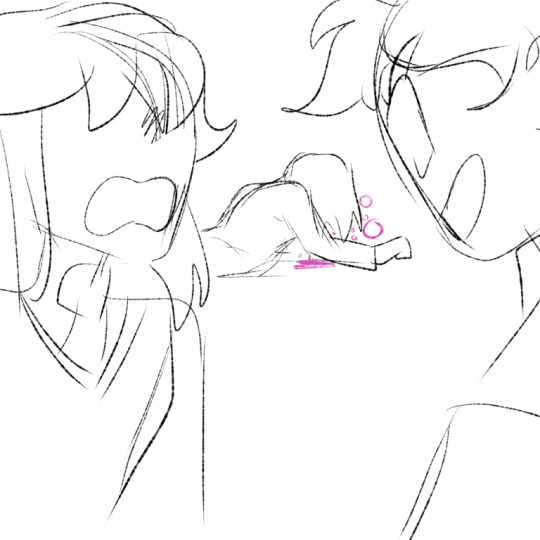
Sorry for the shitty doodles. Drawing this HURT MAN IT HURT
They were just STANDING THERE ARGUING WHILE THIS KID IS CHOKING
Bonus
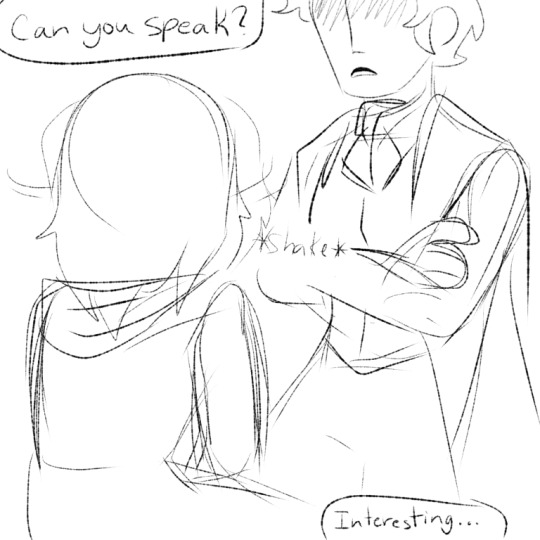
A surprise visit(hints at the thing I’m planning)
87 notes
·
View notes
Note
At some point, it feels like bullying kids lmao
> bro what books is this person reading- bc it sure as hell aint any All the Young Dudes or hp
@inureflower you do know that All the young dudes or whatever fanfic you’re reading is not canon right?
WHAT BOOKS ARE YOU READING, CAUSE THERE SURE AS HELL NOT THE SAME ONES AS ME-
TF??? SNAPE WAS IN A FUCKING WIZARD NAZI-
Wait so Aryan James Porker bullying (half-)Jew Severus was also antisemitic? ‘Cause that’s what you’re basically saying whenever you compare Muggles with Jews and DEs with nazis.
Damn, Jincel Porker really is a sick person
At least literal mixed-race/Jew-coded Severus had the decency to kill the "nazis" down while saving children lives for years (something Jincel was never able to do but we’ll leave it at that)
Keep going though! It’s always fun to see users ‘round here revealing their true colors 🤗
223 notes
·
View notes
Photo
This makes the scene where he doesn't acknowledge Malfoy being almost attacked by Ron when Malfoy calls Hermione a mudblood even better 😂 He can't directly intervene because secretly a death eater yo, but he can let others act for him !

I’m not attacking Ron or protecting Malfoy… but please look at this situation from Snape’s point of view. He know from his own sad experience that in Hogwarts staff tends to close their eyes on Gryffindors’ “mischiefs” and ignore bullied Slytherins. And here’s Snape see how Ron physically attacks Malfoy and grabs his robes! He didn’t hear how Draco insulted Weasley family, he see only thing - Gryffindor student attacking Slytherin student. By the way, it wasn’t self-defense, since Malfoy was using only his words. But as far as Snape knows it could’ve been bully’s attack on other student. What I’m mean is Snape never get the protection from Head of Slytherin House when he was young…so now he protected his own students. And I can understand him.
315 notes
·
View notes
